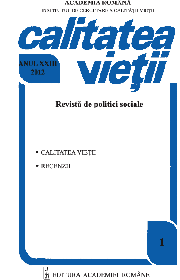Asociațiile de Ajutor Reciproc din România
Mutual support associations in Romania
Author(s): Mihaela LambruSubject(s): Social Sciences
Published by: Editura Academiei Române
Keywords: mutual help associations; mutualism; third sector; social economy; social enterprises
Summary/Abstract: The purpose of this article is to analyse the organizational profile and development stage for the mutual help associations in Romania. Here, the large majority of mutual help assocaitions are Employee Mutual Help Associations (Casa de Ajutor Reciproc a Salariaților – CARS) or Retirees Mutual Help Associations (Casa de Ajutor Reciproc a Pensionarilor – CARP), with each type of mutual help associations having also a specific legislation. After 1990, the mutual help associations managed to survive and develop, as they meet the clear need on the part of Romanian citizens to have a support structure, in order to deal with financial exclusion risks. The article is assessing the present situation of the mutual help associations in Romania, describing the legislation and presenting main data regarding the profile of this type of associations. The data regarding the social economy entities, including mutual help associations, have been identified within the National Institute of Statistics data base, comprising private enterprises – REGIS, collecting information from the fiscal records. The article synthesizes theories/studies on mutual organizations, providing an overview of the theoretical approaches. The research in this area is covered by a multitude of perspectives, from historiography to ethnography of contemporary mutual organizations, from sociological or economic studies to policy studies. Also, at international level, there is a large diversity of organizational forms associated with mutualism. The profile of the mutual organizations active in a specific society depends on the cultural and historical background, economic and political context. In the second part of the article, we present an analysis of the legislative framework enabling the functioning of mutual help organizations in Romania. Here, the mutual help associations are recognized by law. Beside the specific legislation, the Law 122/1996 for Employee Mutual Help Associations (Casa de Ajutor Reciproc a Salariaților – CARS) and 540/2002 for Retirees Mutual Help Associations (Casa de Ajutor Reciproc a Pensionarilor CARP) both type of mutual organization should be registered first as association using the legal framework for associations and foundations – Law 26/2000. In Romania, the mutual help associations are restricted to insurance activities, being registered as non-banking institutions with the Romanian National Bank. Starting from the theory, the conclusions identify the stage of development for mutual help associations as incipient forms of credit unions. In this stage, the mutual help associations have needs that can be met through increased efforts to successfully advocate for legislation change/improvement, increased focus on capacity building, better communications with policy makers and the general public.
Journal: Calitatea vieţii
- Issue Year: XXIV/2013
- Issue No: 2
- Page Range: 157-174
- Page Count: 18
- Language: Romanian

